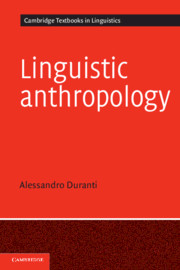Book contents
- Frontmatter
- Contents
- Preface
- Acknowledgments
- 1 The scope of linguistic anthropology
- 2 Theories of culture
- 3 Linguistic diversity
- 4 Ethnographic methods
- 5 Transcription: from writing to digitized images
- 6 Meaning in linguistic forms
- 7 Speaking as social action
- 8 Conversational exchanges
- 9 Units of participation
- 10 Conclusions
- Appendix: Practical tips on recording interaction
- References
- Name index
- Subject index
7 - Speaking as social action
Published online by Cambridge University Press: 05 June 2012
- Frontmatter
- Contents
- Preface
- Acknowledgments
- 1 The scope of linguistic anthropology
- 2 Theories of culture
- 3 Linguistic diversity
- 4 Ethnographic methods
- 5 Transcription: from writing to digitized images
- 6 Meaning in linguistic forms
- 7 Speaking as social action
- 8 Conversational exchanges
- 9 Units of participation
- 10 Conclusions
- Appendix: Practical tips on recording interaction
- References
- Name index
- Subject index
Summary
It is written: “In the beginning was the Word!”
Even now I balk. Can no one help?
I truly cannot rate the word so high.
I must translate otherwise.
I believe the Spirit has inspired me
and must write: “In the beginning there was Mind.”
Think thoroughly on this first line,
hold back your pen from undue haste!
Is it mind that stirs and makes all things?
The text should state: “In the beginning there was Power!”
Yet while I am about to write this down,
something warns me I will not adhere to this.
The Spirit's on my side! The answer is at hand:
I write, assured, “In the beginning was the Deed.”
Johann Wolfgang von Goethe, FaustAs in Faust's reinterpretation of John's Gospel, in this chapter, we will learn that words themselves can be seen as actions and that actions and activities should then be the units of analysis for the anthropological study of language use. In chapter six, we started to see that when we use language, we help constitute the reality we are trying to represent. This was made apparent in the discussion of indexical relations between linguistic expressions and features of the context in which they are used. Not only do certain expressions require an understanding of the surrounding world for their interpretation, they also actively shape such a surrounding world, especially in terms of social identities.
- Type
- Chapter
- Information
- Linguistic Anthropology , pp. 214 - 244Publisher: Cambridge University PressPrint publication year: 1997



